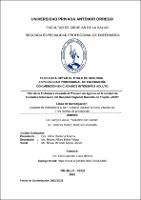Rol de la Enfermera durante el proceso de agonía en la unidad de cuidados intensivos del Hospital Regional Docente de Trujillo -2020

View/
Download
(application/pdf: 55.29Kb)
(application/pdf: 55.29Kb)
Date
2023Author(s)
Cunya García, Yackeline del Carmen
Jiménez Pérez, Maritza Esmeralda
Metadata
Show full item recordAbstract
El presente estudio planteó determinar el rol de la enfermera en las
dimensiones cognitivas, afectivas y conductuales durante el proceso de agonía en
la UCI del HRDT, cuyo enfoque fue cuantitativo, descriptivo y transversal.
Obteniendo como resultados que el 83% del profesional de enfermería consideró
adecuado el cuidado brindado al paciente crítico, Así también en la dimensión
cognitiva el 67% de las enfermeras consideró adecuado los cuidados brindados y
el 33% consideró regular, en la dimensión afectiva el 83% consideró adecuado y el
17% consideró regular los cuidados brindados durante este proceso, y por último
en la dimensión conductual el 50% consideró adecuado obrar de acuerdo a las
reglas de la sociedad, mientras que el 50% restante lo consideró regular basado en
el compromiso moral y ético. Concluyendo con la prueba de confiabilidad del
instrumento mediante el Coeficiente de Alfa de Cronbach de 0.758 y una validez
mediante el coeficiente de correlación entre dimensiones resultando una relación
significativa directa y moderada de la dimensión cognitiva y afectiva de 0.645 y
conductual de 0.485, así como una relación alta de la dimensión afectiva con la
conductual de 0.737. The present study aimed to determine the role of the nurse in the cognitive, affective
and behavioral dimensions during the dying process in the ICU of the HRDT, with a
quantitative, descriptive and cross-sectional approach. The results showed that
83% of the nursing professionals considered the care provided to the critical patient
to be adequate; in the cognitive dimension, 67% of the nurses considered the care
provided to be adequate and 33% considered it to be average; in the affective
dimension, 83% considered the care provided during this process to be adequate
and 17% considered it to be average; and finally, in the behavioral dimension, 50%
considered it to be adequate to act according to the rules of society, while the
remaining 50% considered it to be average based on moral and ethical commitment.
Concluding with the reliability test of the instrument by means of the Cronbach's
Alpha Coefficient of 0.758 and a validity by means of the correlation coefficient
between dimensions resulting in a significant direct and moderate relationship of the
cognitive and affective dimension of 0.645 and behavioral of 0.485, as well as a high
relationship of the affective dimension with the behavioral dimension of 0.737.

